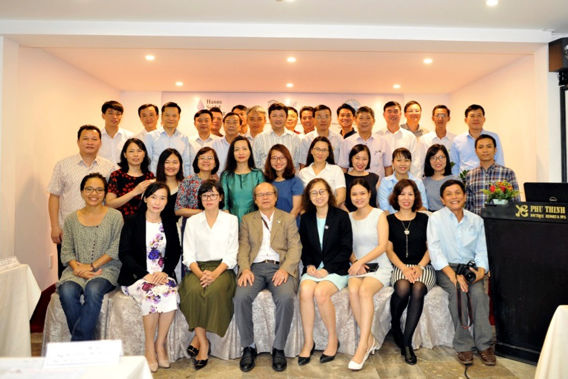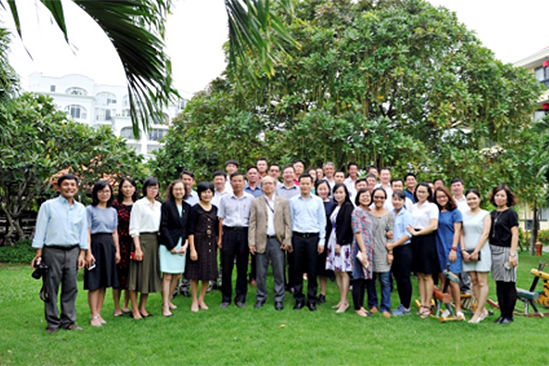The Vietnam Human and Biosphere program and the HSF have organized a Workshop in Hoi An
Promoting innovations for a future with sustainable consumption without plastic waste to achieve the Sustainable Development Goals

Delegates attending the workshop
HSF
Hoi An City People's Committee, Delegation Directors of the Cu Lao Cham-Hoi An Biosphere Reserve, the UNESCO Office in Hanoi, the National Committee of UNESCO in Vietnam, science faculties from various Vietnamese universities and the Ministry of Science and Technology attended the workshop.
The seminar was attended by Mr. Nguyen The Hung, Vice Chairman of the People's Committee of Cu Lao Cham - Hoi An, Representative of the Board of Directors of the Cu Lao Cham - Hoi An Biosphere Reserve, members of the Subcommittee on Science, the Ministry of Science and Technology, representatives of the national UNESCO -Committees of Vietnam, the UNESCO Office in Hanoi, the Vietnam Human and Biosphere Program (MAB), the Hanns Seidel Foundation (HSS) of the Federal Republic of Germany, representatives of nine Vietnamese biosphere reserves: Cat Ba, Red River Delta, Tay Nghe An, Cu Lao Cham - Hoi An, Dong Nai, Can Gio, Ca Mau, Kien Giang, Langbiang, local departments, companies and numerous scientific experts with great interest.
The aim of the workshop was to propose a legal framework for the (world) biosphere in Vietnam in order to integrate solutions and approaches for reducing plastic waste to zero percent and to implement practicable solutions. At the same time, the workshop contributed to the creation of a collaborative platform within the network of World Heritage Sites to promote initiatives to reduce plastic waste. This is intended to raise public awareness of the world heritage sites and create favorable conditions for initiatives that deal with the reduction, collection and reuse of plastic and other solid waste. Each world biosphere area in Vietnam will develop a specific action plan to reduce plastic waste.
The abuse of plastic waste and plastic bags in the daily life of the world population in general and in the worldwide biosphere reserve in Vietnam in particular has contributed many negative consequences for human health, the environment, the ecosystem and pollution. These negative consequences hinder the goals set by the international community and other countries for sustainable development.
According to the United Nations report one million plastic bottles and 5.000 billion disposable plastic bags are used worldwide each year. This means that around 300 million tons of plastic waste are generated worldwide every year, which corresponds roughly to the weight of the entire world population. So far, a total of 9.1 billion tons of plastic waste has been generated on the Earth. The disposal of plastic bags and plastic products leads to soil erosion, which hinders the growth of plants, destroys ecosystems and damages human health.
In view of these problems, the Vietnamese government has developed solutions in recent years that improves communication to raise awareness of the harmful effects of plastic waste and promote the reduction and reuse of plastic products. This is to be strengthened by participating in international initiatives to avoid plastic waste by organizing national, sectoral and local campaigns. In order to promote the world cultural heritage as a model for sustainable local development, the Hanns Seidel Foundation wants to promote the Vietnamese biosphere network together with the UNESCO office in Hanoi, the subcommittee on natural sciences and the MAB Vietnam. The Vietnamese biosphere is to become a pioneer region in the establishment and implementation of solutions to reduce plastic waste, which is supported by the government.

The participants take souvenir photos at the workshop
HSF
During the seminar, experts exchanged their experiences about the initiative "Say no to plastic waste" of the world cultural heritage Cu Lao Cham - Hoi An and about the regional plastic waste initiative of UNESCO. The current status of worldwide and Vietnamese plastic waste, the national action plan for the management of marine waste and the Vietnam Non-Waste Coalition gave an overview of the current situation. Proposed solutions to reduce waste, including plastic waste, based on the T-Learning principle were discussed and helped to find ideas for the disposal of plastic waste in Vietnamese biosphere reserves.
The Cu Lao Cham - Hoi An Biosphere Reserve is a local model for sustainable development with the motto "nature conservation for development and development for nature conservation". The practical experience of the Lao Cham - Hoi An Biosphere Reserve serves as valuable lessons for the entire network of national and international biosphere reserve zones.
In the summary of the conference, Prof. Nguyen Hoang Tri assessed the experiences and opinions of the delegates as good and emphasized that they would help to ensure that the application of evaluation criteria and administrative regulations to limit the use of plastic waste through the use of the Cu Lao Cham biosphere reserve - Hoi An will make an important contribution to improve the quality of life of local communities and improving the management capacity of the world's biosphere reserves in Vietnam.
Source: Department of Social, Humanities and Natural Sciences and Center for Research and Development of science and technology communication.
